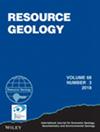沙特西部Jabel Sayid前寒武纪岩石中放射性元素分布的光谱和地球化学意义
IF 0.8
4区 地球科学
Q3 GEOLOGY
引用次数: 0
摘要
使用RS - 230 BGO光谱仪进行了现场伽马射线能谱测量,测量面积为9.4平方公里。在东X方向和北Y方向沿间距为325 m的平行剖面收集了178个光谱点。对结果进行统计处理,以确定最小值、最大值、算术平均值(X)、SD (S)和变异系数(CV %)。光谱调查显示,在长石伟晶岩中存在放射性带,最大eU含量为1,550 ppm, eTh含量为7,974 ppm,而碱花岗岩的平均eU含量为12 ppm, eTh含量为34 ppm。felite的eU和eTh平均值接近碱花岗岩,分别为11和32 ppm。切割碱花岗岩的伟晶岩脉具有较高的eU和eTh值,平均分别为34和101 ppm。Mahd组变质火山岩的放射性最低,平均eU含量为0.8 ppm, eTh含量为1.6 ppm。这些岩石部分显示出岩浆后蚀变过程的证据,如硅化、绢云母化和氧化。除变质火山外,不同岩石品种eU和eTh的强正相关反映了它们在岩浆结晶过程中的地球化学相干性,表明这两种元素在很大程度上被迁入副矿物中,未受到蚀变的干扰。不同岩石单元的CV值呈正态分布,CV值的百分比均小于100,除felsite eU的CV %值略高于100外。辉长岩-伟晶岩、碱花岗岩及其伴生伟晶岩脉的铀向外运移为负值,但仍是铀、钍成矿最有利的寄主岩。对这种矛盾的一种初步解释是,铀大部分被安置在附属矿物中,只发生了有限的不稳定铀再分配,铀与蚀变产物一起沉淀。这一解释得到了钾榴石Pb(UO2)SiO4.(H2O)的支持,这些钾榴石沿着阿长石-伟晶岩的断裂带和石英脉存在。蚀变化学指标估算的风化速率较低,也揭示了研究区铀运移有限。本文章由计算机程序翻译,如有差异,请以英文原文为准。
Significance of radioelements distribution in the Precambrian rocks of Jabel Sayid, western Saudi Arabia, using spectrometric and geochemical data
In situ gamma‐ray spectrometry measurements were carried out using RS‐230 BGO spectrometer over an area of 9.4 km2. One hundred and seventy eight spectrometric points were collected along parallel profiles with spacing 325 m in the Easting X direction and Northing Y direction. The results are treated statistically to determine the minimum, maximum, arithmetic mean (X), SD (S), and coefficient of variability (CV %). The spectrometric survey revealed the presence of radioactive zones in the aplite‐pegmatite with maximum eU content of 1,550 ppm and eTh of 7,974 ppm, whereas alkali granite has an average eU content of 12 ppm and eTh of 34 ppm. Felsite has an average eU and eTh close to that of alkali granite, 11 and 32 ppm, respectively. Pegmatite veins cutting alkali granite have high values of eU and eTh, an average of 34 and 101 ppm, respectively. The metamorphosed volcanic rocks of the Mahd Group demonstrate the lowest radioactivity with an average eU content of 0.8 ppm and eTh of 1.6 ppm. These rocks partly show evidences of post‐magmatic alteration processes, for example, silicification, sericitization, and oxidation. Excluding metavolcanics, the strong positive correlation between eU and eTh for the different rock varieties reflects their geochemical coherence during magma crystallization and indicates that both elements are largely accommodated into accessory minerals and were not disturbed by alteration. The CV values of the different rock units show normal distribution, where all the percentages of CV values are less than 100, with the exception of eU of felsite that shows CV % value slightly higher than 100. The aplite‐pegmatite, alkali granite, and the associated pegmatite veins show negative value of uranium outward migration, but are still the most favorable host rocks for uranium and thorium mineralization. A tentative interpretation of such contradiction suggests that uranium is largely accommodated into accessory minerals and only limited labile uranium redistribution has occurred and uranium was precipitated in association with alteration products. This interpretation is supported by the presence of kasolite Pb(UO2)SiO4.(H2O), along the fractured zones and quartz veins in the aplite‐pegmatite. The limited uranium migration in the study area was also revealed by the low weathering rate estimated by the calculations of chemical indices of alteration.
求助全文
通过发布文献求助,成功后即可免费获取论文全文。
去求助
来源期刊

Resource Geology
地学-地质学
CiteScore
2.30
自引率
14.30%
发文量
18
审稿时长
12 months
期刊介绍:
Resource Geology is an international journal focusing on economic geology, geochemistry and environmental geology. Its purpose is to contribute to the promotion of earth sciences related to metallic and non-metallic mineral deposits mainly in Asia, Oceania and the Circum-Pacific region, although other parts of the world are also considered.
Launched in 1998 by the Society for Resource Geology, the journal is published quarterly in English, making it more accessible to the international geological community. The journal publishes high quality papers of interest to those engaged in research and exploration of mineral deposits.
 求助内容:
求助内容: 应助结果提醒方式:
应助结果提醒方式:


